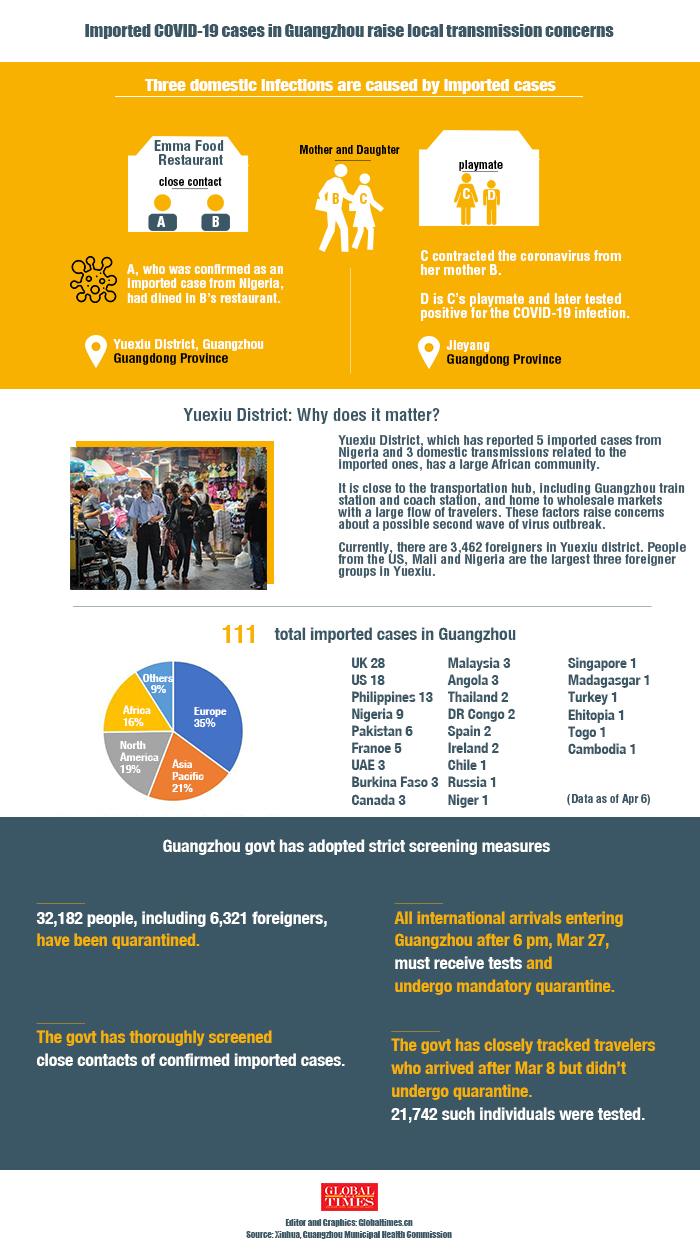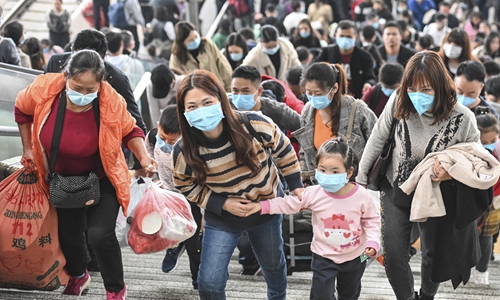HOME >> CHINA
Guangzhou ups infection risk level
By Zhang Han Source:Global Times Published: 2020/4/7 21:53:40
City conducts retrospective screening of overseas arrivals after new cases

Infographic: Globaltimes.cn
Analysts and residents urged the city government to strengthen screening of inbound travelers and management at the community level as the risks of sporadic cases and small-scale outbreaks persist.
Guangzhou on Tuesday announced it was upgrading the risk levels of Yuexiu and Baiyun districts from low to medium after the discovery of domestic infections related to imported cases.
The city also released details of a situation where imported cases from Nigeria caused five domestic infections in two cities. The Nigerians were confirmed infections during the quarantine period, but they had been to eight restaurants, nine hotels and 12 public places before being put into central quarantine. Their activities caused 197 close contacts to be put into quarantine and 1,680 people with the risk of exposure had to take nucleic acid tests for COVID-19, according to Tuesday's government press conference.
COVID-19 control work is aimed at safeguarding both Chinese and foreigners' health and safety in the country, and procedures are carried out regardless of nationality, China's Ministry of Foreign Affairs spokesperson Zhao Lijian said at Tuesday's routine press conference.
China treats all people equally, Zhao said, easing concerns about whether strengthened measures would lead to discrimination against foreigners.
With the resumption of work and increasing trans-regional exchanges, "it [epidemic control] is not only a matter for Guangzhou, but also for the sake of the whole country," Yang Zhanqiu, a virologist from Wuhan University, said on Tuesday.
Guangzhou has reported 111 imported cases so far, including 25 foreign nationals. Among them, nine were from Nigeria, three from Angola, two from the Democratic Republic of the Congo and two from Niger.
On March 27, Guangzhou tightened its policy, asking all arrivals from overseas to undergo central quarantine at their own expenses. Before that, people who were not from high-risk regions or who did not arrive via high-risk flights were free to walk around. Foreigners with a travel history were allowed to undergo home quarantine.
Government officials on Tuesday noted the city had started retrospective screening of people exempted from central quarantine, extending health monitoring to 21,742 people. Some 1,038 passengers who came via high-risk flights have been moved from their homes to central quarantine and have taken nucleic acid tests.
The city reported two infections on March 28 involving people who did not undergo any quarantine upon arrival as they were not from high-risk regions and arrived before the tightened policy. The Chinese couple began home quarantine after the policy adjustment and they were confirmed to have contracted the coronavirus.
On Tuesday, Guangzhou police announced they had ordered a foreigner to leave China within a designated period of time after the man tried to escape central quarantine.

During the 2020 Spring Festival travel rush, many passengers wearing medical masks to protect themselves from the novel coronavirus leave a platform of the Guangzhou South Railway station, a railway hub of Guangzhou, South China's Guangdong Province, on Wednesday. Photo: cnsphoto
Public health analysts noted there had been a major loophole before the policy change. Once international arrivals return to their communities, it will be very hard for grass-roots workers to keep an eye on all of them, considering there are always people who lack the discipline to follow home quarantine rules, Yang said, noting retrospective screening could find and round up some virus carriers.
The loophole before the policy change poses a danger to everyone as many people who arrived before March 27 have not passed the incubation period, which means there could be more domestic infections in the coming days, Yang told the Global Times.
There were 32,183 international arrivals, including 6,321 foreigners, under central or home quarantine as of Tuesday, according to official data.
Guangzhou is now using a "3+1" model to carry out community epidemic control, which means each work team will have a grass-roots worker, a medical professional and a police officer, plus an interpreter if necessary.
As a city with active international exchanges, Guangzhou's management of foreigners has also sparked concerns. Many panicked after an article went viral claiming imported cases from Nigeria could cause a domestic outbreak in the African community and further spread the disease. The article also said that Guangzhou is building makeshift hospitals to deal with the situation.
A Yuexiu district official denied the article's claim of 300,000 African nationals living in the district, saying 3,462 foreigners in the district are mainly from the US, Mali, Nigeria, Canada and Australia. The man who fabricated the viral article is under investigation and will be dealt with accordingly, Yuexiu police said.
But some suspect the official number could be an underestimate. A resident surnamed Liu from Yuexiu district told the Global Times that regulation of foreigners is difficult at the community level. Some have been in Guangzhou for many years without legal documents. Old communities in the district lack the residence records or staff to screen and monitor their situations, Liu said.
Posted in: SOCIETY